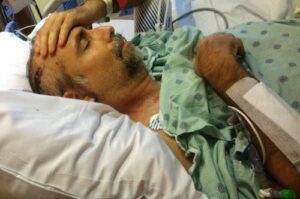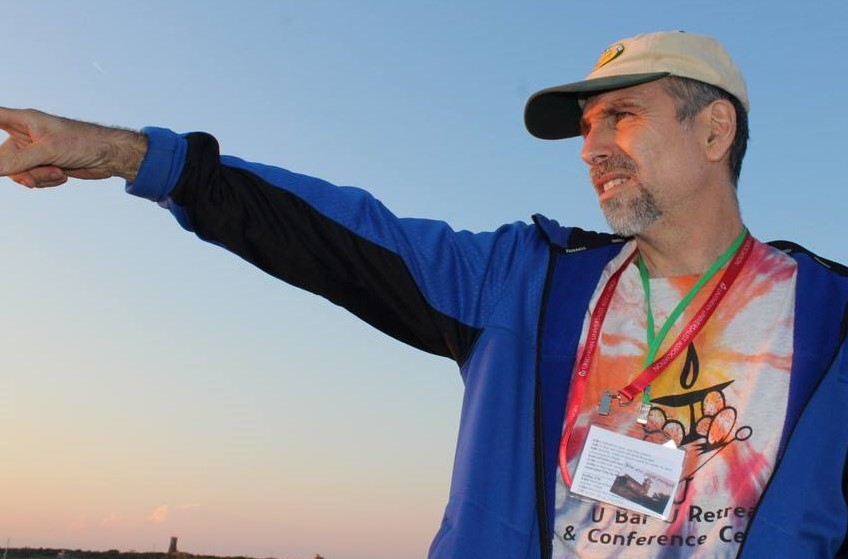To view a recording of this Access Forum, you can go to the Videos section on this website, or you may view it on YouTube.
On 30 August, 2020, the second of these Access Forums was held. This time, special guest speaker Rev. Phillip Schulman, currently living in Texas, joined us to discuss his own experience with Traumatic Brain Injury, something he has dealt with since an accident three years ago.
Rev. Phillip Schulman’s talk was entitled “The Struggle & Dignity of a Minister with Traumatic Brain Injury: Post Traumatic Spiritual Gifts.”
A 1989 Graduate of UU Starr King School for the Ministry, Phillip has served four UU congregations as Minister. He has been a community organizer and director of various holistic and peer support programs for wellness and restorative justice.
Phillip has been an advocate for the rights for system survivors. He  worked on numerous MindFreedom International campaigns to end fraud, abuse and violence of the mental health industry. He organized Electroshock (ECT) survivors to testify before the Texas legislature. He also directed the “Crisis Alternatives Program” in Essex County, New York, one of the nation’s first peer-run crisis respites, and served as chaplain at national conferences. Phillip is a lifelong student of nonviolence organizing for progressive social change, peace, nuclear disarmament, and environmental protection.
worked on numerous MindFreedom International campaigns to end fraud, abuse and violence of the mental health industry. He organized Electroshock (ECT) survivors to testify before the Texas legislature. He also directed the “Crisis Alternatives Program” in Essex County, New York, one of the nation’s first peer-run crisis respites, and served as chaplain at national conferences. Phillip is a lifelong student of nonviolence organizing for progressive social change, peace, nuclear disarmament, and environmental protection.
In 2017, a half-ton truck struck Phillip on his bicycle, when he acquired his TBI.
Because of time constraints, Rev. Phillip Schulman was not able to answer all the questions brought up during the Q&A. He was however more than happy to answer some of these after the Forum, and graciously provided his answers to some viewers’ questions below. Thanks, Reverend!
BM: Did you notice any difference in mental health challenges as compared with before the accident?
Phillip: I do not think in terms of mental health challenges.
If you are asking me if I was ever distraught, confused, upset, disturbed after the trauma, yes I was.
If you are asking me if my mental and emotional anguish ever reached levels that it impaired my ability to function, yes it did.
I am keenly aware that certain consciousness increases my ability to digest adversity and find I’ve received post-traumatic spiritual gifts. I am aware that there are ways of influencing myself and others that increase the likelihood of suffering and decrease the likelihood of being able to have agency to navigate this world. I’m also aware, as Helen Keller was, that had I been from a poor family instead of being a person of means, my miraculous recovery would almost certainly not have happened.
I believe these more important causes of pain and suffering become obscured when we speak of them using medical language.
I neglected to articulate that I have experienced, and at times continue to experience, levels of vulnerability that I did not before the accident. At times it has seemed almost more than I could bear. However, I am blessed with effective support and a deep faith.
JD: It sounds like feeling support from others provided great comfort. What ways worked best to request support? And was it difficult for you to make those requests?
Phillip: You have that exactly right. I was saved by the love that came pouring down on me. And yes, I found that I needed to step up my game from day 1 in terms of self-advocacy and learning to ask for help. Being direct has worked best. Often my learning came in hindsight when I realized that I hadn’t even imagined the possibility that I could ask specifically for what I need.
LM: Sending love from California!… Question: What are your hopes and intentions for the next few years of your life? I know it will involve service, just curious in what manner or context.
Phillip: You have touched on the hardest aspect in my experience of trauma. The physical aspects were harder than I had ever known, and yet this was the easiest part. The mental and emotional healing have been harder. These too have been relatively easy compared to the task of coming up with a new plan for my life. Along with the assault on my body, several other losses put me up against some of the greatest challenges I ever faced at a time when my mental capacity was greatly impaired. The TBI led me to experience emotional volatility. That I have slowly been stepping forward to handle challenges and find new purpose is probably what I am most grateful for.
Before COVID, I bought a van and had a plan for adventure including more MAD Movement ministry. I trust that G-d is guiding my steps. She has already given me many varied and new opportunities to be of service. These do bless me with meaning and purpose. I trust that more will be revealed to me as I continue.
Thank you so much for speaking today! I’m curious whether your understanding of nonviolent communication (NVC) lent itself to relearning speech or other aspects of healing and interface with the world?
Phillip: Well for the difficult process of relearning how to form the various sounds, consonants, vowels, etc., I’m not sure that NVC helped. Being a student and practitioner of nonviolent communication has taught me to tune into the feelings and needs being expressed. This is invaluable for connecting, collaborating, learning from, and healing conflicts inside and outside of me. Of course, it’s a big job and I have a lot to learn.

